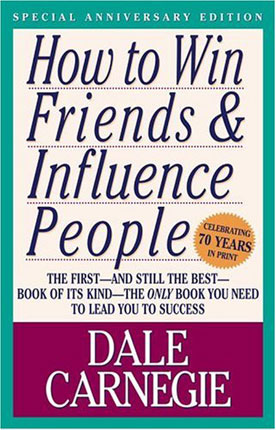
As much as I love the concept of self-reliance and being able to do everything (more productively) myself, a lot of the time getting things done better or faster means having to work with others. This is why we like to emphasize the social aspects of productivity at Asian Efficiency.
Here are our notes on how to apply Carnegie’s book to make your communications with other flow better, and more productive.
The Notes
The fundamentals of Carnegie’s techniques lie in two things:
- An absence of criticizing, condemning or complaining about others, and
- An honest and sincere appreciation of others in relation to their motivations in life (list below).
The first is obvious, though in the modern world no one seems to follow it.
The second is interesting in application – yes, we can appreciate these things in relation to others, but we can also use our understanding of these motivations to get ourselves to do things too:
- Health and the preservation of life.
- Food.
- Sleep.
- Money and material things.
- Life in the hereafter.
- Sexual gratification.
- Well-being of our children.
- Feeling of importance.
These can form the basis of an “area of life” division for classifying our goals or outcomes. It’s also worth asking “why” in each of these areas on a yearly basis to see if we are moving forward or backwards in each area.
Carnegie’s techniques also rely on three other concepts:
- Making people like you.
- Handling arguments effectively.
- Leading conversations.
Making Other People Like You
The way he outlines to achieve this is simple – be genuinely interested in other people. Like, really, really, be interested. Don’t just fake it.
If you’re trying to have someone do something for you (e.g., getting a colleague to pull a report or data for a work project), it helps incredibly if they like you. As much as I would prefer that people leave their emotions out of the business world, the reality is not everyone is an Efficient Asian™ and we often have to compensate for that.
Handling Arguments
Carnegie’s simple solution to handling disagreements is to avoid them in the first place. I’m pretty sure he isn’t referring to some strange passive-aggressive manifestation though – I think he genuinely believes that you can sidestep most disagreements simply by being friendly and not making an issue of things.
He lists a lot of different ways to handle arguments – but you’ll have to read the book for that.
Leading Conversation
This is the really cool part of the book about using conversational jujitsu to influence people. Here are some:
- Praise and honest appreciation.
- Calling on people’s mistakes indirectly via metaphor or example.
- Softening statements by using questions.
- Creating reputations for people to live up to – including yourself.
- Encouraging others. We all need to do this more.
- Making the other person happy about doing what you suggest, through clarity, empathy and creating a match in interests.
A lot of Carnegie’s techniques refer to what is known as framing, which is the art of creating a context around conversations and interactions to influence them. If there’s enough interest, we can put together an article on framing for Asian Efficiency readers (let us know in the comments).
Recommendations
If you’ve never studied communication skills as an art or science before, How to Win Friends and Influence People (audiobook) is a great introduction.
The language and context of the book is somewhat dated though, so keep that in mind. There is a huge chunk of effective communication skills missing from the book, which is the use of boundary functions. There’s an upcoming AE article about boundaries, but we would recommend any of Wayne Dyer’s books in the meantime.
The great thing about Carnegie’s book is that you can use the suggestions on yourself – for influencing how you see yourself, how you talk to yourself (criticisms, condemnations) and how you motivate yourself to get things done.